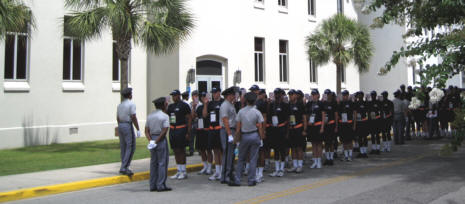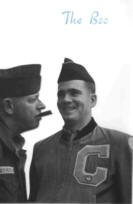

The year is 1963 and I speak from memory…. I was standing in the sand at The Citadel beach house. Only freshmen were allowed this particular day. All about me milled the bleating herd of freshmen who had survived the initial immersion into the system. This day at the beach was our respite… During plebe week I had a senior put a cigarette out on my arm, fainted in exhaustion during a sweat party, and hung suspended from a wall pipe while some daring young sergeant held a sword beneath me. This, I reasoned, was evidence enough that I had made a serious error in my choice of colleges. Unless you have attended a military school and unless you went through the plebe system, you will not fully appreciate my feelings at this time.
Memory differs from experience. Memory softens the features of upperclassmen’s faces that once seemed to emanate a sinister and all-corrosive evil. I forget much of the cruelty of that year, but remember most of those deliriously happy moments when the freshmen would gain small and insignificant victories over their tormentors. The one indelible image I carry from that day is of a gray-haired, cigar-smoking, Lieutenant Colonel in the Army with a voice like a noon whistle. In a single moment of time, he imprinted his face and voice in the minds of every freshman on the beach. This was The Boo.
— From the book
Description
In 1961, Lt. Colonel Nugent Courvoisie accepted the job as assistant commandant of cadets at The Citadel, the military college of South Carolina. During the next seven years, The Boo, as the cadets called him, was in charge of meting out punishment to those young men accused of breaking Citadel law. The Boo was a harsh guardian of justice, but he was also an extremely compassionate and sensitive individual who cared deeply about the young men placed under his jurisdiction. If he was often stern and uncompromising, he was also concerned and understanding. He possessed a special ability in dealing with the problem cadet; the boy who found The Citadel too difficult or too confining; the boy from the broken home, or the boy forced to go to a military college by parents who had failed him. He empathized with cadets who were stifled by the system and, in his own way, tried to guide them through the obstacles that inevitably littered the path to graduation.
The Boo was many things to many people. During the years as assistant commandant, he was part analyst, part confessor, part detective, part father, part son of a bitch, and all soldier.
This is the story of the Boo and the story of The Citadel from 1961-1968. It is the story of young men and the man they turned to for laughter, for help, and for inspiration.
The Boo was Pat Conroy’s first book. It was self-published by Pat in 1969, following his graduation from The Citadel. The Old New York Book Shop Press reprinted it in 1988. The book was at first banned by the school but the ban has long since been lifted.
The original preface read:
The book, in essence, is the love affair of Courvoisie (The Boo) for the cadets and his school. The stories within the book were not written maliciously or callously; they were written to show an inside view of the long gray line, an intimate view not often afforded to the general public. The Citadel is quirky, eccentric, and unforgettable. The Boo and I collaborated on this book to celebrate a school we both love—each in our different ways. Proceeds for the book will go to a gift fund honoring Citadel graduates killed in Viet Nam.